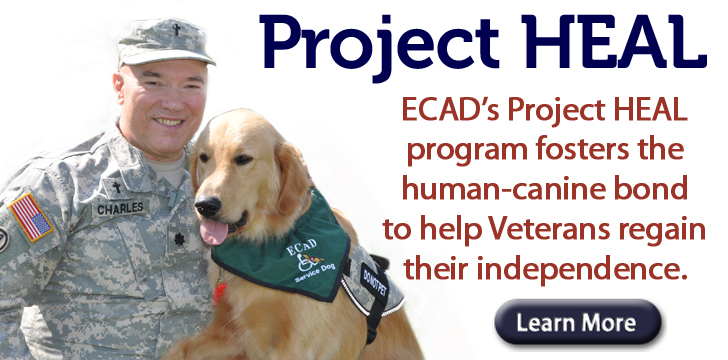Assitance Dogs
ECAD’s mission of providing highly skilled Service Dogs to increase mobility and independence for people living with disabilities manifests itself in a variety of programs and services. Each one designed to meet the needs of a specific population: Veterans, at-risk youth, persons living with disabilities or in stressful circumstances, and children as young as two with Autism.
Core Programs:
-
Open Doors
ECAD’s core program whereby Assistance Dogs are educated to prepare them for a career as a Service or Facility Dog.
- Service Dogs
Our Service Dogs have helped over 200 disabled clients.
- Facility Dogs
Our Facility Dogs, who can be found in hospitals, nursing homes, courthouses, etc., have helped thousands of distressed individuals.
- Service Dogs
-
Canine Magic
Specially educated Service Dogs assist children with autism - some as young as two years old - to build emotional bonding, cognitive development, socialization, and safety.
-
Project HEAL™
Three interrelated programs designed to meet the needs of Veterans living with physical injuries, Post Traumatic Stress Disorder (PTSD), and/or Traumatic Brain Injury (TBI).
- Service Dogs
Specifically educated Service Dogs who help ward off panic attacks, provide a physical barrier in public places, and/or provide mobility and retrieval assistance.
- Transitions
Teaches Veterans to educate Service Dogs to be placed with fellow Veterans. Veterans in this program also act as mentors and role models to the at-risk youth, with whom they work side-by-side to educate the dogs.
- Service Dogs
Client’s Bill of Rights
ECAD (Educated Canines Assisting with Disabilities) provides specialized training for individuals with disabilities, preparing them and ECAD dogs for certification as Service Dog Teams. Upon acceptance as a client of ECAD, certain obligations must be met. The client’s goal in applying is to become an ECAD certified Team. In order to maintain the high standards required by ECAD, these expectations can be achieved only if the client fulfills their responsibilities. Read More
Career Opportunities
ECAD is proud to be an equal opportunity employer. We celebrate diversity and are committed to creating an inclusive environment for all employees.
No opportunities available at this time.
Public Documentation
ECAD takes pride in our financial efficiency of $0.88 of every dollar goes directly to programming costs. We are committed to using every donor dollar responsibly and in doing so, retaining our donors. ECAD’s fiscal values are such that, we are constantly evaluating budgetary issues in an effort to improve on our already impressive statistic.
Public Documents
IRS Form 990
2008 | 2009 | 2010 | 2011 | 2012 | 2013 | 2014 | 2015 | 2016 | 2017 | 2018 | 2019 | 2020 | 2021 | 2022 | 2023 | 2024
Audited Financial Statement
2012 | 2013 | 2014 | 2015 | 2016 | 2017 | 2018 | 2019 | 2020 | 2021 | 2022 | 2023 | 2024
501(c)(3) Tax Exempt Determination Letter
Board of Directors
2017 | 2018 | 2020 | 2022 | 2023 | 2024
Public Policies
- Document Retention & Destruction Policy
- Fundraising & Donor Privacy Policies & Procedures
- Whistle Blower Protection Policy
- Conflict of Interest Policy
- Conflict of Interest Policy
- Whistle Blowers Policy
- Donor Privacy Policy
Articles of Incorporation
Charity Navigator is America's premier independent charity evaluator. They help charitable givers make intelligent giving decisions by providing in-depth, objective ratings and analysis of the financial health and accountability & transparency of America's largest charities. Click on their logo to find out how Charity Navigator rated us!
Document Retention and Destruction Policy
1. Policy and Purposes.
This Policy represents the policy of East Coast Assistance Dogs, Inc. (ECAD), DBA, Educated Canines Assisting with Disabilities with respect to retention and destruction of documents and other records, both in hard copy and electronic media (which may merely be referred to as "documents" in this Policy). The Document Retention and Destruction Policy identifies the record retention responsibilities of staff, volunteers, board members, and outsiders (independent contractors via agreements with them) for maintaining and documenting the storage and destruction of ECAD’s documents and records. ECAD reserves the right to revise or revoke this Policy at any time.
2. Administration
2.1 Administrator Responsibilities.
ECAD’s Finance and Accounting Director shall be the administrator (“Administrator”) in charge of administration of this Policy. The Administrators responsibilities shall include supervising and coordination the destruction and retention of documents pursuant to this Policy and specifically the Retention Schedule included in this Policy. The Administrator will also be responsible for documenting all actions taken to destroy and/or maintain organization documents and retaining said documents. The Administrator may also modify the schedule as necessary to comply with law or to include additional/revised document categories which are appropriate to reflect organizational policies and procedures. The Administrator also has the authority to review this Policy and Policy compliance periodically with counsel and report to the Board of Directors as to compliance. The Administrator may appoint assistants to facilitate carrying out responsibilities, with the Administrator, however, retaining final responsibility for administration of this Policy.2.2. Constituent Responsibilities.
This Policy also relates to the responsibilities of staff, volunteers, board members and outsiders with respect to maintaining and documenting storage and destruction of organizational documents. ECAD’s staff shall be familiar with this Policy, shall act in accordance therewith, and shall assist the Administrator, as requested, in implementing it. The responsibility of volunteers with respect to this Policy shall be to produce specifically identified documents upon the request of management, if the volunteer still retains such documents. In that regard, after each project in which a volunteer has been involved, or each term which the volunteer has served, it shall be the responsibility of the Administrator to confirm whatever types of documents the volunteer has retained and to request any documents the Administrator feels wills be necessary for retention by the organization. Outsiders may include vendors or other service providers. Depending upon the sensitivity of the documents involved with the particular outsider relationship, ECAD, through the Administrator, shall share this Policy with the outsider, requesting compliance. In certain instances, the Administrator may require that the contract with the outsider specify the particular responsibilities of said outsider with respect to this Policy.3. Suspension of Document Destruction; Compliance.
ECAD becomes subject to a duty to preserve (or halt the destruction of) documents once litigation, an audit or a government investigation is reasonably anticipated. Further, federal law imposes criminal liability (with fines and/or imprisonment for not more than 20 years) upon whomever ‘knowingly alters, destroys, mutilates, conceals, covers up, falsifies, or makes a false entry in any record, document, or tangible object with intent to impede, obstruct, or influence the investigation or proper administration of any matter within the jurisdiction of any department or agency of the United States… or in relation to or contemplation of any such matter or case.” Therefore, if the Administrator becomes aware that litigation, a governmental audit or a government investigation has been instituted, or is reasonably anticipated or contemplated, the Administrator shall immediately order a halt to all destruction under this Policy, communicating the order to all affected constituencies in writing. The Administrator may thereafter amend or rescind the order only after conferring with legal counsel. If any board member or staff member becomes aware that litigation, a governmental audit or a government investigation has been instituted, or is reasonably anticipated or contemplated, with respect to ECAD, and they are not sure whether the Administrator is aware of it, they shall make the Administrator aware of it. Failure to comply with this Policy, including, particularly, disobeying any destruction halt order, could result in possible civil or criminal sanctions. In addition, for staff, it could lead to disciplinary action including possible termination.
4. Electronic Documents; Document Integrity.
Documents in electronic format shall be maintained just as hard copy or paper documents are, in accordance with the Document Retention Schedule. Due to the fact that the integrity of electronic documents, whether with respect to the ease of alteration or deletion, or otherwise, may come into question, the Administrator shall attempt to establish standards for document integrity, including guidelines for handling electronic files, backup procedures, archiving of documents, and regular checkups of the reliability of the system; provided, that such standards shall only be implemented to the extent that they are reasonably attainable considering the resources and other priorities of ECAD.
5. Privacy.
It shall be the responsibility of the Administrator, after consultation with counsel, to determine how privacy laws will apply to ECAD’s documents from and with respect to employees and other constituencies; to establish reasonable procedures for compliance with such privacy laws; and to allow for their audit and review on regular basis.
6. Emergency Planning.
Documents shall be stored in a safe and accessible manner. Documents which are necessary for the continued operation of ECAD in the case of an emergency shall be regularly duplicated or backed up and maintained in an off-site location. The Administrator shall develop reasonable procedures for document retention in the case of an emergency.
7. Document Creation and Generation.
The Administrator shall discuss with staff the ways in which documents are created or generated. With respect to each employee or organizational function, the Administrator shall attempt to determine whether documents are created which can be easily segregated from others, so that, when it comes time to destroy (or retain) those documents, they can be easily culled from the others for disposition. For example, on an employee-by-employee basis, are e-mails and other documents of a significantly non-sensitive nature so that they might be deleted, even in the face of a litigation hold with respect to other, more sensitive, documents? Ideally, ECAD will create and archive documents in a way that can readily identify and destroy documents with similar expirations.
8. Document Retention Schedule.
All records will be held at
|
Type of Document |
Minimum Requirement |
|
Accounts payable ledgers and schedules |
7 years |
|
Audit reports |
Permanently |
|
Bank reconciliations |
2 years |
|
Bank statements |
3 years |
|
Checks (for important payments and purchases) |
Permanently |
|
Contracts, mortgages, notes, and leases (expired) |
7 years |
|
Contracts (still in effect) |
Contract period |
|
Correspondence (general) |
2 years |
|
Correspondence (legal and important matters) |
Permanently |
|
Correspondence (with customers and vendors) |
2 years |
|
Deeds, mortgages, and bills of sale |
Permanently |
|
Depreciation schedules |
Permanently |
|
Duplicate deposit slips |
2 years |
|
Employment applications |
3 years |
|
Expense analyses/expense distribution schedules |
7 years |
|
Year-end financial statements |
Permanently |
|
Insurance records, current accident reports, claims, policies, and so on (active and expired) |
Permanently |
|
Internal audit reports |
3 years |
|
Inventory records for products, materials, and supplies |
3 years |
|
Invoices (to customers, from vendors) |
7 years |
|
Minute books, bylaws, and charter |
Permanently |
|
Patents and related papers |
Permanently |
|
Payroll records and summaries |
7 years |
|
Personnel files (terminated employees) |
7 years |
|
Retirement and pension records |
Permanently |
|
Tax returns and worksheets |
Permanently |
|
Timesheets |
7 years |
|
Trademark registrations and copyrights |
Permanently |
|
Withholding tax statements |
7 years |
Help Us Reach Our Goal 
10%
ECAD, Educated Canines Assisting with Disabilities is a 501(c)(3) nonprofit organization and we depend on generosity of people like you to continue changing lives.
ECAD Volunteer Opportunities

There are many ways you can be a part of the miraculous process of turning tiny puppies into confident and mature Service Dogs.









